Our editor-in-chief Nate Yapp is proud to have contributed to the new book Hidden Horror: A Celebration of 101 Underrated and Overlooked Fright Flicks, edited by Aaron Christensen. Another contributors include Anthony Timpone, B.J. Colangelo, Dave Alexander, Classic-Horror.com's own Robert C. Ring and John W. Bowen. Pick up a copy today from Amazon.com!
"Cry Wolf" (Cast and Crew) Interview
Children shouldn't tell lies, and big teenaged children shouldn't make up stories about people dying. Such are the lessons in the upcoming horror-thriller Cry Wolf. Classic-Horror sat down with the cast and crew during San Diego Comic-Con International 2005. In attendance were co-writer/director Jeff Wadlow, co-writer/producer Beau Bauman, and actors Lindy Booth (Dodger), Julian Morris (Owen), Sandra McCoy (Mercedes), and Kristy Wu (Regina).
Q: Let's start out with the big question: what the heck is this film about?
Beau Bauman: Cry Wolf is a modern day retelling of "The Boy Who Cried Wolf," about a group of kids at an elite boarding prep school who play a game of lies, and they take this game to the next level. There's a murder outside their school, and they start creating a lore and a mythology about this fictional serial killer who they propose committed this crime. But the lies start coming true and after describing themselves as the victims, people start turning up dead. Bad things start happening, because it is a modern day retelling of "The Boy Who Cried Wolf," and they're known as liars then once they start trying to tell people that these people are dying, no-one will believe them. It's very scary and we hope a little bit smart.
Q: What were some of the inspirations behind the writing process?
Jeff Wadlow: Probably our biggest inspiration or the biggest idea was this concept that the iconic movie killer had sorta lost its mystique. Starting with Freddy, they sorta made it a little more comedic and it evolved into almost like a wrestler with Freddy vs Jason -- there was no mystery really left. So our idea was to take that concept and try to imbue it with some more mystery and some more suspense and hopefully we would ultimately generate more fear. Basically, just be a little more economical with how we use the character and how we would create it. And in the process of creating it, really ground it in the real world.
Q: So this is pretty much a no-holds-barred thriller-horror film, then?
Jeff Wadlow: Yes. Very much. It's a slow burn. It's sort of like a lot of 70s horror films in that you establish a threat and you slowly build it and drop little clues and things start happening and by the last half-an-hour, it's a no-holds-barred "run for your life" situation.
Q: There's been a lot of horror films lately that have said "we're going back to the 70s." Rob Zombie's been saying it, when they made Wrong Turn with Eliza Dushku, that was sort of a callback, when they remade Texas Chainsaw Massacre, that was a callback. This is obviously a different thread back to the 70s but why do you think it's the 1970s that people are going back to for inspiration?
Jeff Wadlow: Things swing back and forth. We had this deconstructionist period with Scream and Urban Legend and films like that. I think we're seeing the pendulum swing back. In the films you just referenced -- we're similar to those films in the sense that we try to get that primal fear back into the movie, but we're dissimilar in that there's also a lot of subtext. There's a lot of complexities and there's a real mystery that pulls you through that is evocative of a lot of other films from the 70s like Three Days of the Condor, something like that, where there's a larger mystery at play.
Q: Let's talk about the process of making the film a little, from a casting perspective. How did you find the right people for the right roles?
Kristy Wu: They're still looking.
Beau Bauman: Our casting director, her name is Fern Champion, she actually discovered Cameron Diaz and put her in The Mask. That was kind of our challenge to Fern was to give us not only one but eight leads that were all just going to be break-out stars. We actually wanted this to be the film where 10 years from now people wouldn't believe that all of these kids starred in the same movie at the same time, like if you look back at School Ties or The Outsiders or something. And she did it, and everyone's just absolutely amazing.
Jeff Wadlow: The casting process was exhaustive. We saw hundreds and hundreds of actors in Los Angeles, Toronto, New York.
Beau Bauman: Tapes came in from Miami, Europe, worldwide.
Jeff Wadlow: We saw people who were undiscovered. We saw models. We just saw every person that could possibly be in this film, because we really wanted to find the right cast. The one thing that all of our cast members have in common is that they all brought something to the role that we did not imagine initially and added another level. Whenever there was a situation where we were, towards the end, considering two people, it was always the person who added something that got the job.
Beau Bauman: It was also important to us to cast authentic-looking teenagers. It's been kind of a pet peeve of ours that over the years, people started making fun of the teen thriller genre because these high school kids started looking like they were 30, because, well, they were. So that was another thing that made our casting process unique and helped us discover new emerging talent because we really wanted young people who looked young.
Jeff Wadlow: I bet it drove these guys crazy because we brought everyone back. We were so paranoid about making sure we had the right combination.
Beau Bauman: I would love to hear -- Can you guys tell us what the casting process was like from your side?
Kristy Wu: It was hairy. You know the waiting room, you have the couple girls waiting to read for your role. It's like going to court or something because they're like (points) you, you, you. It's like picking a jury: "Don't pick me. Yes, pick me. Don't pick me." And it just goes back and forth and back and forth. But I actually had fun when I was in the Mix & Match room.
Julian Morris: I was so scared. And also when you do read a script that is so good -- I can speak for all of us -- we were all over-bowled by this incredible script and this amazing end. You want the job, you want the character so badly that just puts more pressure on you to get the role. So I was terrified at the last stages.
Sandra McCoy: I was as well. It was my first mix & match ever and it's just really easy to psyche yourself out, when you're like maybe they want prettier, because she's way hotter. Maybe they want bustier because she's bustier. It's hard to not psyche yourself out and try to put the people together yourself when you actually go in and do it.
Jeff Wadlow: There's a funny story about Sandy from the Mix & Match. We had a couple actresses we were considering for Mercedes.
Sandra McCoy: Some hot girls. I left crying.
Jeff Wadlow: We read Sandy up against a bunch of different people. We'd seen her pretty much against everyone, so we said you can go home, 'cause we hadn't seen the other girls yet. So Sandy left. We saw one other girl and she left. And we had one girl left and that girl who was left probably thinking, "Oh, I've got the job."
Sandra McCoy: I thought that.
Jeff Wadlow: We realized that Sandy was the one, so we actually called her on her cellphone and said, "You gotta come back." We wanted to read her some more against some of the other guys. And so she comes back and she goes, "Yeah, they called and they told me to come back." And apparently our intern who was out in the waiting room said this last girl's face just went white.
Beau Bauman: The Mix and Match, everybody tossed that term around; towards the end of the casting process after we kind of whittled it down to two or three choices, even though we kind of knew who we wanted, we just wanted to make sure that everybody worked well together, because there are so many scenes where the group dynamic is so important. These kids, these characters are supposed to be so tight that they finish each others sentences. They've been going to school together for the last four years. So we wanted to make sure that before we settled on the right person independently that they all worked together as a group.
Jeff Wadlow: And the only person who wasn't in the mix and match was Lindy Booth, because we cast her out of Toronto.
Q: So how did you guys feel about the chemistry on the set?
Julian Morris: I've never worked on a project where there's been better chemistry. We were such close friends. We'd just go out constantly. Normally when you finish movies you're like "Hey, great. See each other soon," and you never do. But on this we have gone out.
Kristy Wu: I really think it speaks for itself. We hang out quite regularly, see each other for parties.
Julian Morris: And that energy comes through in the movie. Like, you see us and these guys are quite close. They're friends in the movie.
Lindy Booth: We also did a week of rehearsals before we actually got to filming. I think that helped us a lot, because it was the group of us hanging out. We also lived together in an apartment building, like Kristy, Sandy, and I had an apartment like a three bedroom apartment and we lived together and hung out and ate dinner together and ate breakfast.
Sandra McCoy: And drove.
Lindy Booth: Went shopping. And so it became very much like being at boarding school, where we just sort of knew each other's ins and outs really well. We knew what people looked like in the morning before they put their makeup on, running around in their underwear.
Julian Morris: Lindy, didn't we end up like in a park at midnight going over lines, doing a scene? Remember that?
Lindy Booth: Oh yeah!
Julian Morris: This is like this great, great scene. Really scary. We had a drama coach on the movie and she said we should go out and just practice it. And we went out to this park near the hotel, it's like midnight, doing the scene.
Lindy Booth: I totally forgot that.
Julian Morris: And it was great. It was totally fun doing that. And it comes across in the movie.
Lindy Booth: Julian and I went through a bunch of crazy acting exercises to get to know each other better, because our relationship is very pivotal in the movie. Julian plays the new guy and play, like, the leader of the pack that he becomes involved with, so we played all sorts of fun games.
Sandra McCoy: And Jeff clapped a lot.
(Jeff claps)
Q: So are you guys all horror fans here?
(Everybody nods except Sandra, who shakes her head)
Sandra McCoy: Scared out of my wits.
Kristy Wu: I just like to be scared. If it's a good movie, then I'm a fan of good movies. This is a good movie.
Jeff Wadlow: One thing we talked a lot about the film when we wrote it, and made it, and even when we edited it, was how to make it scary in a Jaws vs. Jaws 2 kind of formula. Where in Jaws, you're rooting for the people, and in Jaws 2, you're rooting for the shark. We very much tried to make sure the film was the kind of story where you cared about the characters, you wanted to see them survive, you were invested in it, and then a lot of scares and a lot of fear was generated by the situations they were put in once you had that emotional connection.
Q: That had to be difficult, though, given that the premise of the film has them pretty much digging their own graves.
Jeff Wadlow: WHICH IS GREAT! Because you like them -- they're funny, they're witty, you want to hang out with them. You see them do this thing and it's kind of fun the way they do it, and you're like, "Yeah that looks like that fun." And then they get into trouble and you're like, "Uh, maybe that wasn't so much fun." You're on the ride. You never are standing back, I hope and I believe, you're never standing back judging them. You're definitely in it with them from the beginning.
Lindy Booth: And I think that, too, is what makes The Wolf, the killer, such a scary villain, such a bad bad guy, is because the kids, we create him. He's our worst nightmare. We're like, "Ooh, let's think of a bad guy. And like, we throw out all our worst nightmares, and they all come back to haunt us. I think that's what makes it so terrifying. They're all our fears.
Jeff Wadlow: So personal.
Beau Bauman: And tragic.
Kristy Wu: You are your own worst enemy.
Q: You're not a fan of horror films, Sandra. You're shaking your head there.
Sandra McCoy: No, they scare the crap out of me. This one... When I read the script and then I waited for the audition, I didn't sleep at all.
Julian Morris: Didn't you end up crying in the screening a bit?
Sandra McCoy: It still scares me and I know what happens.
Q: What's everyone's favorite horror film?
Julian Morris: Such a difficult question...
Jeff Wadlow: Seven is, by far, my favorite. For me, I love that film because people talk about it being so gory and violent, and it's really not. What happens is it creates all these situations where the audience becomes an active participant in the film instead of passively just watching things happen. They're really into it, so they imagine the crimes, they imagine how everybody was killed. When they leave the film, they think it was much more horrific than it really is. I think that's a testament to the power of cinema, that it can actually get people to close the gaps and create the images in their own mind, and they have such an emotional response to that. Whatever you think of in your head is ten times more powerful than what we can create on the screen.
Sandra McCoy: I know one that scared me. I think it was called Copycat. Yeah, I didn't want to jog in public after that, because I think there was a woman who... That was the only thing I remember not wanting to do after a while.
Julian Morris: To name one is impossible for me, but I think what I look for in a great horror film and a great thriller is that thing when you're shocked. Like, when you're in the cinema and you're on the edge of your seat, and you're with the players and the characters in the film. And in great horror, once you get out of the film, you're still thinking about it your still scared. And in this one, the ending leaves you like that. You can't speak. You don't know what to think. You're just left with "What the f*** have I just seen?"
Kristy Wu: Same. Can't think of one right now. In a good horror film, it would be something that's real. Not some zombie, not something that we're not familiar with, but something that's close to you. Something you could see everyday put in a different situation that just scares you out of your mind. You don't know what to think. You don't know what to feel. You can't even move.
Lindy Booth: I'm a big fan of classic-y kind of... I love Psycho and I love Carrie. Those would probably be two of my favorites. Because I think they're just really good movies. I think they're great stories, and for me that's what attracts me to any film, like a really well-acted, well-written, well-shot film. It's a story, and it doesn't matter what genre it's in, it's just a good movie. I think Psycho and Carrie are both really good movies.
Beau Bauman: I'm also a huge Psycho fan and also a Jaws fan. Anything that takes something familiar and makes it terrifying... Psycho, you're afraid to take a shower. Jaws, you're afraid to go in the water. Just those everyday thing. I guess for our film, I dunno, maybe if people are afraid to log onto Instant Messager, maybe we've done our jobs.
Julian Morris: Sometimes what you know best is the scariest.
Q: Let's talk about the Instant Messenger. The marketing campaign has been pretty innovative for this film. You've got the Instant Messenger stuff going on. The Internet's really played an integral part. How much input did you have into the marketing?
Jeff Wadlow: Lots. In fact, we have a partnership with AOL, which is due entirely to Beau. Before we even had distribution, he pursued a relationship with them. Instant Messenger is such a part of the script, because the way the story unfolds, they create this story about this iconic killer, and they send it out into the world as a viral e-mail. Then they start to be contacted by someone through IMs. So they've basically opened this Pandora's Box and invited this evil presence into their lives. It's also a big part of how they communicate with each other. These kids are very tech-savvy. So Beau approached AOL and pitched them the idea of taking the lying game in the film and turning it an online game -- basically an online version of "Mafia" -- and they jumped at the idea. So, we've been partners ever since.
Julian Morris: What's great as well is since The Blair Witch Project, the movie starts much sooner than the actual release, because of the Internet. Because of thewolfiswatching.com, you've got people already getting into it and like, "Who's the Wolf?" and talking about it and working things out and playing games and getting scared before anybody's even seen the film.
Q: What was your favorite part about making this movie?
Kristy Wu: I think as a group, we would all respond meeting each other, because we've all been really close. But no, you can go into your technical answers, boys.
Julian Morris: To love this genre and to watch movies like this and to be involved. Just like being on set and looking around you and seeing some guy chasing you with a knife. It's crazy, to be in there. It's amazing.
Beau Bauman: I think there are two parts that I love. One was actually the casting process, which was, you know, we'd been writing this script for months, and actually seeing these incredible actors bring these characters to life, it was just literally the whole thing took a hard left turn around the corner, it became something else. Something bigger than just words on the page, something greater than that. The other part, you know, Jeff often says that he doesn't believe that the filmmaking process is complete until the last step of that process -- presenting that film to the audience. I cannot agree more. I'm actually looking forward to seeing it in the theater with an audience. And watching people jump when they're supposed to jump, and scream when they're supposed to scream, and laugh when they're supposed to laugh. I think that's going to be the real validation of all of our hard work.
Sandra McCoy: I don't think it will ever be possible to work on a set again where there's just so much passion for the project, so much pull for it. Being that Beau and Jeff were, of sorts, first-time director and producer for a feature film.
Jeff Wadlow: Not of sorts. (laughs) They're black or white things.
Sandra McCoy: You just want to work so hard for them. They're just so into it and it's everything they've been working for. It just makes everybody want to work harder. I don't think they ever had to bear down on us. Maybe one night, we were playing a game too late. Other than that, everyone just wanted to give so much, and nobody took a step back. Since then, I've been on sets where it's different. People don't care about the project. They care about their turn-around or how much they're getting paid. And nobody cared about any of those things here. It was fun to just live with these people on set and in real life, because everybody just cared so much. And there's not going to be anything like that in a project, I don't think, for the rest of my professional career.
Kristy Wu: Yeah, I agree with that. Because everybody cared so much, it made it real. It made the scenes real, and feeling that was an amazing, amazing feeling to actually feel scared even though you know that it's fake. Even though you know it's all planned. To be in the scene and to have this reality of "Oh my God, that's my friend over there," is great.
Julian Morris: It's incredible to think that the amount of money that this film was made for, the passion behind it was made by fans. And that energy and the excitement that we're making the movie we want to make and we can terrify people so much -- that comes across in the film.
Classic-Horror.com would like to thank Jeff, Beau, Julian, Lindy, Sandra, and Kristy for taking the time out of their busy schedules to sit down and talk with us. Cry Wolf is unleashed in the US on September 23rd, 2005.
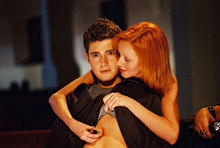 | 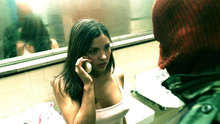 | 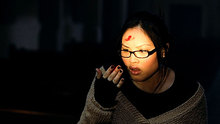 |



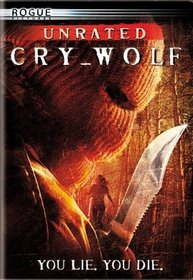



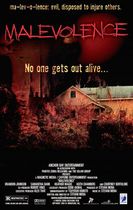

Best horror movie...